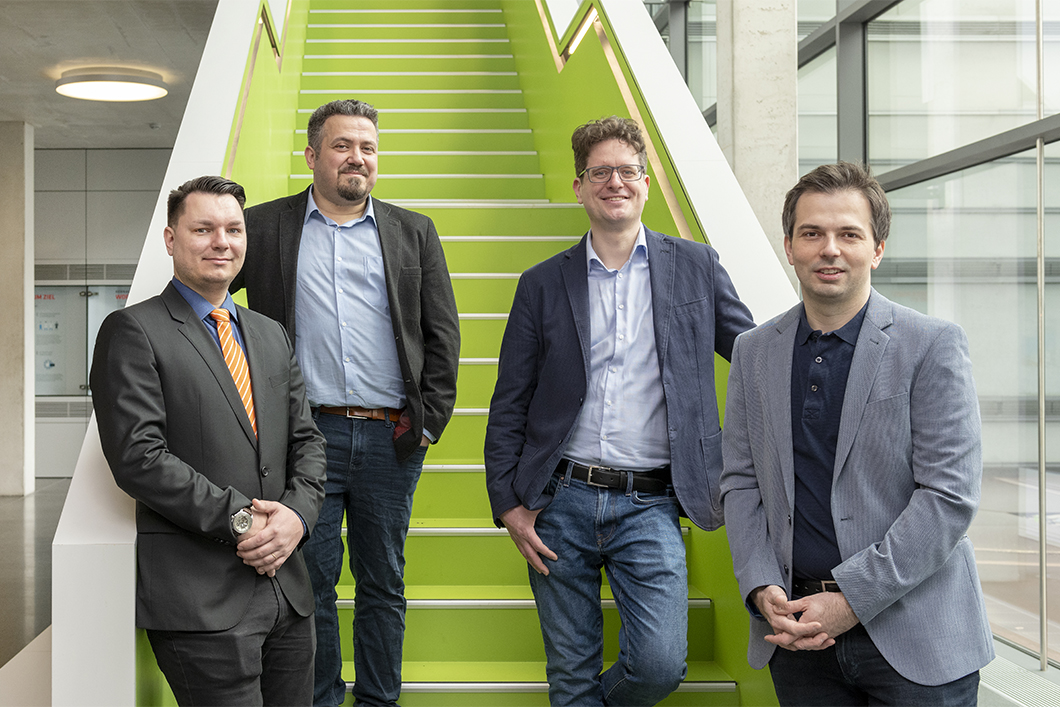
The founding team of True Detection Systems GmbH: Christopher Walter, Mustafa Biyikal, Martin Kaiser and Bruno Jan Rycek (from left to right).
Source: BAM
The detection of explosives is important for civil security. Existing sensors are heavy, expensive, and require extensive maintenance. A team of founders from the Bundesanstalt für Materialforschung und -prüfung (BAM) aims to bring a mobile explosives trace detector to the market that detects explosives more reliably and thus makes an important contribution to civil security.
In the field of civil security, explosives are currently mainly detected at security checkpoints in airports with stationary devices. The few portable devices on the market weigh an average of five kilograms, which severely limits their suitability for mobile use. In addition, the maintenance and cleaning of these devices are very costly.
"For most users, the devices are also too expensive to purchase. They are not water tolerant and therefore prone to false alarms in high humidity. Since they operate on the basis of ion mobility spectrometry, some devices contain a radioactive source and are subject to numerous safety regulations for transport, storage, use and disposal," explains Mustafa Biyikal, an expert in chemical sensors at BAM.
A few years ago, Biyikal set out to develop an explosives detector that is not only more powerful but also lighter and cheaper than existing devices. Together with Knut Rurack, his mentor at BAM, he developed a novel detection chemistry based on chemical-optical measurement technology and has since obtained several patents for it. Special dyes are used to detect explosives. They react to the explosives such as TNT and change their fluorescence behaviour, which is then detected by a photomultiplier tube and converted into an electronic signal. Detection takes place within seconds. A unique feature is that after measuring a heavily contaminated sample, only the chip has to be replaced, without the need for extensive cleaning of the entire device. They also managed to incorporate detection for nitro, nitrate, peroxide, and inorganic explosives on a chip the size of a postage stamp (lab-on-a-chip), thus saving weight.
Now the sensor expert wants to bring a superior explosives detector, weighing only 1.3 kilograms, to market maturity via a start-up. For this purpose, he is founding True Detection Systems GmbH (TDS) together with his BAM colleagues Martin Kaiser and Bruno Jan Rycek, experts in artificial intelligence and finance and marketing, respectively, and Christopher Walter, an engineer from the aviation industry. The team will be supported by the EXIST funding programme of the Federal Ministry for Economic Affairs and Climate Action (BMWK) for the next year and a half. EXIST is aimed, among others, at scientists from non-university research institutions who want to realise a business idea around an innovative product.
Starting in 2025, the team wants to launch the explosives sensor initially in the EU and Great Britain, and later also in the USA, Canada, and Asia.
"Our sensor is of great interest to a broad market, including the federal and state police forces in Germany, the German Federal Armed Forces, fire brigades, the Federal Agency for Technical Relief, public authorities, customs and, of course, private security companies," says team member Bruno Jan Rycek.
"The spin-off of True Detection Systems GmbH in the important field of civil security demonstrates the application-oriented and innovative research carried out at BAM. It is another example of successful technology transfer from science to practice," says BAM President Prof. Dr Ulrich Panne. "I wish the founding team every success."


